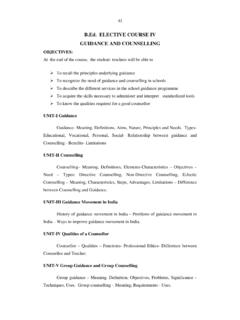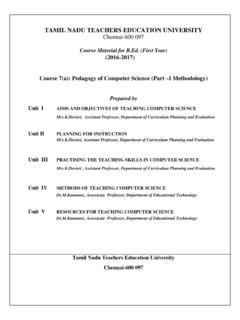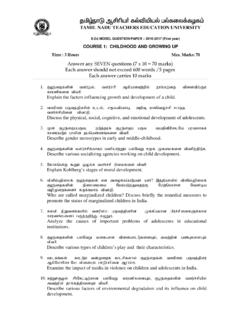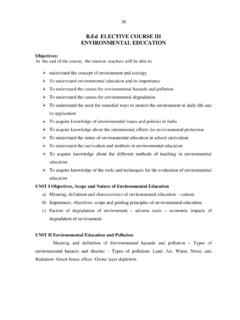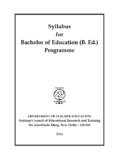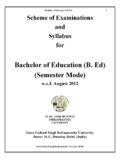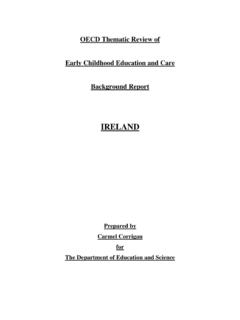Transcription of TAMIL NADU TEACHERS EDUCATION UNIVERSITY Chennai …
1 TAMIL nadu TEACHERS EDUCATION UNIVERSITY Chennai -600 097 Course Material for ( First Year) (2016-2017) Course 2: Contemporary India and EDUCATION Prepared by Unit VI Policy Framework on EDUCATION : Post-independent India , Associate Professor , Assistant Professor Unit VII Educational Planning and Financing , Professor and Head , Assistant Professor Unit VIII Language Policy in EDUCATION , Assistant Professor Unit IX Midday Meal Scheme as a Socialisation Process , Assistant Professor Unit X Emerging Trends in EDUCATION , Assistant Professor Department of Educational Planning and Administration TAMIL nadu TEACHERS EDUCATION UNIVERSITY Chennai -600 097 2 Unit VI Policy Framework on EDUCATION : Post- Independent India Objectives: After the completion of the unit, the learners will be able to: 1.
2 Explain the salient features of Kothari Commission. 2. comprehend the recommendations of the NPE (1986). 3. acquaint with the key features of NKC (2005). 4. critically analyse the aspects of NCF (2005). Introduction In pursuance of the constitutional mandate, the Government of India, has initiated several measures for social and economic reconstruction of the country. The educational reconstruction has been one among such measures. Various commissions and committees were appointed at different times to survey, study, review and recommend improvements in the existing system, policies and programmes of EDUCATION . Kothari Commission (1964 1966) Kothari Commission (1964-1966), popularly known as Indian EDUCATION Commission, was an ad hoc commission set up by the Government of India to examine all aspects of the educational sector in India, to evolve a general pattern of EDUCATION and to advise guidelines, and policies for the development of EDUCATION in India.
3 The EDUCATION Commission under the Chairmanship of Dr. Kothari, the then Chairman, UNIVERSITY Grants Commission, began its task on October 2, 1964 and submitted its report on June 29 1966. The major recommendations of the Kothari Commission are as follows: i) Introduction of work-experience which includes manual work, production experience, etc. and social service as integral part of general EDUCATION at more or less all levels of EDUCATION . ii) Stress on moral EDUCATION and inculcation of a sense of social responsibility. Schools should recognize their responsibility in facilitating the transition of youth from the work of school to the world of work and life. iii) Vocationalization of secondary EDUCATION . 3 iv) Strengthening of the centres of advance study and setting up of a small number of major universities which would aim at achieving highest international standards.
4 V) Special emphasis on the training and quality of TEACHERS for schools. vi) EDUCATION for agriculture and research in agriculture and allied sciences should be given a high priority in the scheme of educational reconstruction. Energetic and imaginative steps are required to draw a reasonable proportion of talent to go in for advance study and research in agriculture science. vii) Development of quality or pace-setting institutions at all stages and in all sectors. The Commission observed that mother-tongue had a pre-eminent claim as the medium of EDUCATION at the school and college levels. Moreover, the medium of EDUCATION in school and higher EDUCATION should generally be the same. The regional languages should, therefore, be adopted as the media of EDUCATION in higher EDUCATION . The Commission further observed that the public demand for secondary and higher EDUCATION had increased and would continue to increase in future.
5 It was, therefore, necessary to adopt a policy of selective admissions to higher secondary and UNIVERSITY EDUCATION in order to bridge the gap between the public demand and available facilities. The Commission was of the view that the social segregation in schools should be eliminated by the adoption of the neighbourhood social concept at the lower primary stage under which all children in the neighbourhood will be required to attend the school in the locality. Iswar Bhai Patel Committee (1977) The All India Council of Technical EDUCATION at a meeting held during the year 1974-75, made important recommendations relating to the establishment of appropriate links between industry and educational research institutions, programmes of vocational EDUCATION and the establishment of teacher training centres in the field of management EDUCATION . With the passage of time, the Review Committee on the curriculum, for the ten years schooling, popularly known as Ishwar Bhai Patel Committee (1977), categorically recommended in its report for the compulsory introduction of Socially Useful Productive Work (SUPW) at the secondary schools.
6 Accordingly, the scheme SUPW was introduced in almost all the secondary schools of the country and a period was allotted in the time-table for this purpose. The main purpose of this scheme was to inculcate in learners, the liking and love for the dignity of labour. To begin with, 4 there was much enthusiasm for the implementation of SUPW. But, as time went on, initiative and zeal gradually slackened. In-fact, tangible result was not achieved. Macolm S. Adiseshiah Committee (1978) In the year 1978, a Committee was appointed under the Chairmanship of Macolm S. Adiseshiah for +2 stage and the report was entitled Learning to do, towards the Learning and Working socially. This Committee was appointed specially for higher secondary EDUCATION with special reference to vocationalisation. It also recommended for SUPW at the school level and vocationalisation of the higher secondary EDUCATION .
7 It also pleaded eloquently for the effective implementation of relating EDUCATION to productivity. Major recommendations of the Committee (i) Learning must be based on Socially Useful Productive Work (SUPW) or through vocationalised courses; (ii) Vocational courses should be in agriculture and related rural occupational areas; (iii) In the general and vocationalised educational spectrum there should be no rigid streaming of courses. In accordance with the availability of facilities and the demand of the area, each school should be allowed to offer such general and vocational courses; (iv) The higher secondary stage should comprise of a general EDUCATION spectrum and a vocational spectrum; (v) The curriculum should be so structured that the courses lend themselves for imparting instruction interns of well-connected modules to enable the students to choose and combine them according to their needs; (vi) On a priority basis books should be written suiting to the local needs for imparting instruction in vocational courses; (vii) Semester pattern and credit system should be introduced in classes XI and XII; (viii) To start with counselling and placement officers be appointed in clusters of 3 or 4 schools, particularly in rural areas.
8 (ix) Services of persons who have had actual experience of on the job may be fruitfully utilized to teach vocational courses. Wherever necessary part-time TEACHERS may be 5 appointed. In respect of TEACHERS of vocational courses there should not be insistence on post-graduate qualification; and (x) For bringing about proposed changes at this stage of EDUCATION both pre-service and in-service teacher EDUCATION programme should be properly organised. New EDUCATION Policy (1986) The National Policy on EDUCATION (NPE) is a policy formulated by the Government of India to promote EDUCATION . The policy covers elementary EDUCATION to colleges in both rural and urban India. The first NPE was introduced in 1968 by the government of Prime Minister Indira Gandhi, and the second by Prime Minister Rajiv Gandhi in 1986. A committee was set up under the chairmanship of Acharya Ramamurti in May 1990 to review NPE and to make recommendations for its modifications.
9 1. National System of EDUCATION : Though EDUCATION is a State subject, this policy provides a National System of EDUCATION , , 10 + 2 + 3 system. 2. Equality: This policy provides equal opportunities to all for EDUCATION . Navodaya schools have been opened for socially and economically deprived but to talented children. Regional imbalances are also being removed. 3. EDUCATION of Scheduled Castes: Scholarships, hostel facilities, adult EDUCATION programmes are being introduced to socially and economically deprived scheduled castes. 4. Women s EDUCATION : New EDUCATION Policy gave special emphasis to women s EDUCATION . This statement owes that women are the keys to nation s progress. Eradication of illiteracy, vocational curriculum, nutrition and child care courses, home management, etc., are given priority. 5. EDUCATION for Tribes: This policy gave main emphasis to the EDUCATION of tribes.
10 Residential Ashram Schools have been opened for them; and scholarships for higher EDUCATION are also given to them. 6. Adult EDUCATION : EDUCATION Policy gave a programme for adult EDUCATION to remove the illiteracy from the masses. For this, adult schools, libraries, distance EDUCATION , programmes are being introduced. 6 7. EDUCATION for Other Backward Classes (OBCs): A large number of backward classes, minority classes have not been given any opportunity for EDUCATION . These classes have a very crucial situation. They are socially and economically deprived due to their profession, but they usually linked themselves with higher varnas thus upper castes do not give them social sanction. 8. Integrated EDUCATION for Disabled Children:It has been established scientifically that disabled children with mild handicaps make better progress academically and psychologically if they study with the normal integrate these children with others in common schools, a revised scheme of Integrated EDUCATION for Disabled Children was started during 1987-88.
